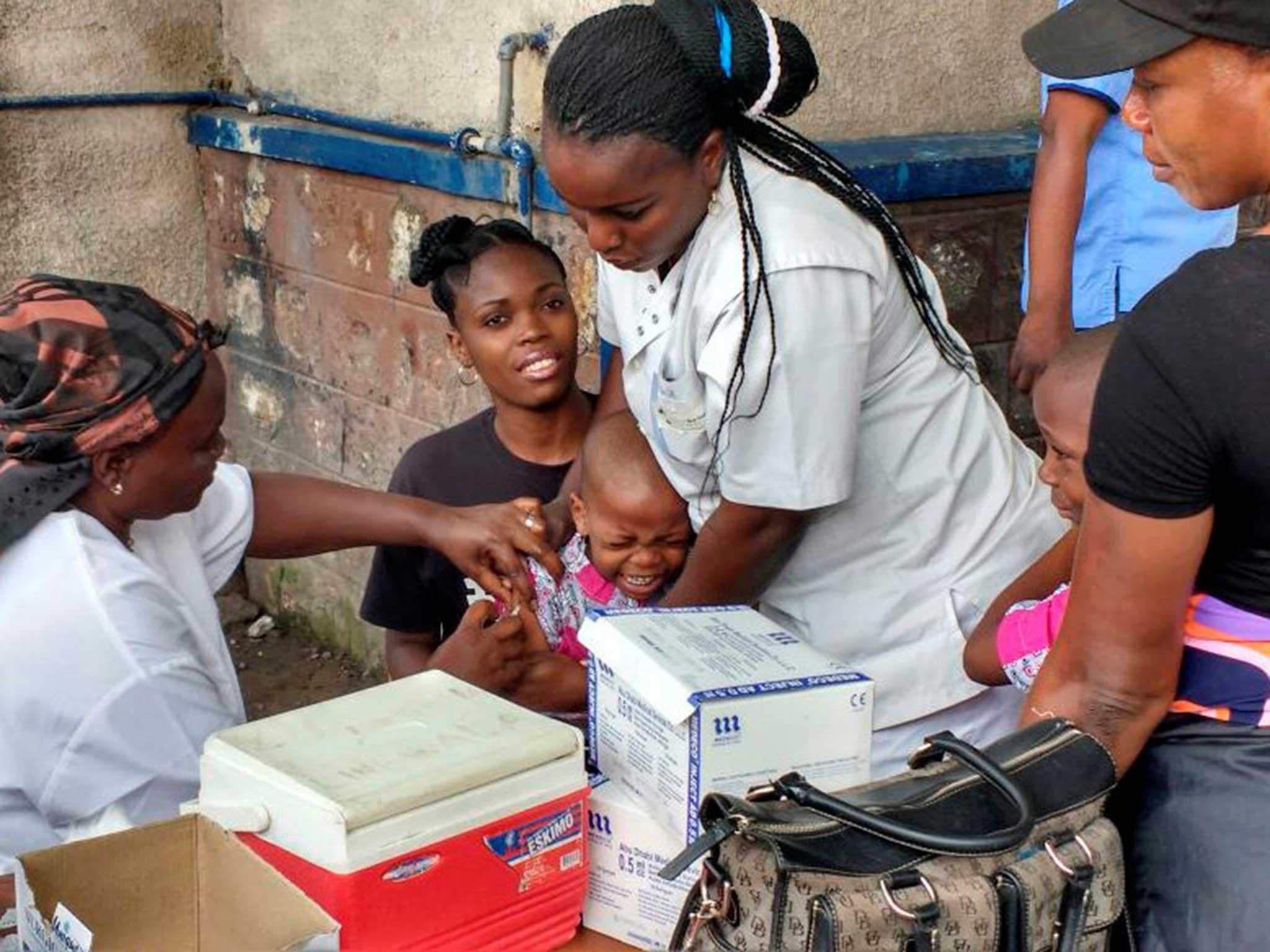Yellow Fever vaccination campaign begins as WHO warns it must succeed to prevent international emergency
What began as an isolated outbreak in Angola has now claimed hundreds of lives

Your support helps us to tell the story
From reproductive rights to climate change to Big Tech, The Independent is on the ground when the story is developing. Whether it's investigating the financials of Elon Musk's pro-Trump PAC or producing our latest documentary, 'The A Word', which shines a light on the American women fighting for reproductive rights, we know how important it is to parse out the facts from the messaging.
At such a critical moment in US history, we need reporters on the ground. Your donation allows us to keep sending journalists to speak to both sides of the story.
The Independent is trusted by Americans across the entire political spectrum. And unlike many other quality news outlets, we choose not to lock Americans out of our reporting and analysis with paywalls. We believe quality journalism should be available to everyone, paid for by those who can afford it.
Your support makes all the difference.As one of the most ambitious urgent vaccination programmes in history got under way on Wednesday to combat Yellow Fever in central Africa, the World Health Organisation warned that it must succeed in order to prevent an international health emergency.
A deadly virus, Yellow Fever is passed on by mosquitoes and can cause bleeding from the eyes, nose and mouth, jaundice and organ failure. The current strain has a fatality rate of around 20 per cent.
What began as an isolated outbreak in Angola has now claimed hundreds of lives, spreading across the border into Democratic Republic of Congo (DRC) and exporting cases to Uganda, Kenya and even a dozen in China.
WHO says the current outbreak of Yellow Fever represents unprecedented challenges, occurring for the first time in a dense urban population where people have little resistance, and at a time when travel between major African cities has become increasingly popular.
Save The Children has warned that the virus in “on the brink” of going global, spreading to Europe, Americas and further in Asia. The charity, Doctors Without Borders and other international organisations are helping local campaigns coordinated by WHO across DRC and Angola, with the aim of inoculating more than 14 million people at 8,000 locations.
That target represents huge logistical challenges, particularly given the concerns over vaccine stock levels. The DRC government has ordered health workers to use just one-fifth of the standard dose, giving a year’s protection, to make supplies stretch further.
Speaking to The Independent, an official with WHO’s health emergency team in Africa admitted the situation in central Africa had proved “complex and challenging” since the current outbreak was declared in February this year.
Joy Caminade said the campaigns in Angola and DRC represented a “strong response” to the real threat of a global spread, and that the outbreak continues to be classified as a “serious public health event warranting intensified national action and enhanced international support” - for now.
“The aim is to prevent a Public Health Emergency of International Concern,” she said, using the category which WHO applied to the Ebola crisis and, most recently, the worldwide Zika outbreak.
“For the first time, WHO and other partners are dealing with an outbreak of yellow fever in a dense, urban setting,” Ms Caminade said.
“The changing global situation in the past 20 years, including the rapid rise of urbanisation, increased mobility between large cities in Africa, and new environmental and climatic factors mean an increased risk of mosquito-borne diseases spreading internationally.”
“This outbreak is manageable if we can protect enough people with the vaccine,” she said, adding that there is particular “urgency to ensure the outbreak in DRC is under control before the onset of the rainy season” - in September.
Save The Children has dispatched an emergency response team of health workers to Kinshasa, the DRC capital, and is focussing its efforts in the first 10 days of the campaign on the city’s Binza Ozone suburb, whose population of 426,000 people are seen as among the most at risk.
Heather Kerr, Save the Children's country director for the DRC, told The Independent it was still too “early days” to say on the first day if the campaign to prevent a global outbreak would be a success - but she said her team was “quietly confident”.
“The campaign has started well,” she said. “Lots of people have turned up, and we hope the whole population of Binza Ozone will be vaccinated by the time the campaign finishes in 10 days’ time.”
Save The Children have been among those expressing concern at the stock levels and management of the Yellow Fever vaccine.
An email chain between NGO workers seen by the Associated Press this month appeared to show charities arguing over the loss of around one million doses of the vaccine. "WE HAVE A MAJOR PROBLEM ON OUR HANDS," wrote Unicef’s Robert Kezaala in an all-caps email to officials at WHO and elsewhere.
Save The Children said it understood there were just seven million doses of the vaccine left in global stockpiles - not even enough to properly inoculate the 10-million strong population of Kinshasa, let alone deal with an international outbreak.
Ms Caminade sought to allay fears over supplies. She said that since February, the WHO had “worked closely with manufacturers to prioritise production of yellow fever vaccines”.
She said: “After accounting for vaccines that will be used in the upcoming mass vaccinations in both Angola and DRC, there will be around 5 million doses to respond to other outbreaks.”
Join our commenting forum
Join thought-provoking conversations, follow other Independent readers and see their replies
Comments